We were burgled while staying in a rented cottage just outside Ubud in Bali. We lost all our laptops and tablets, a substantial amount of cash, our driving licences and other things besides. These are the lessons we learned from our experience – the things we did wrong and the things we’d done right.
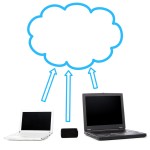 Back it up
Back it up
You know all computer data needs to be backed up, right? And that the back-up needs to be physically remote from the original, such as on the cloud? But have you actually done it?
We had. Phew. Or rather, Mr V had – as a former IT professional he is meticulous about these things.
With so many (too many!) devices, he had installed BitTorrent Sync so that a file created on one device would replicate on all the others, as a local back-up. One laptop then backed up to Crashplan automatically whenever it was connected to the internet. So that was the data files taken care of, including his thousands of photos.
Our collection of books, films, TV shows and radio podcasts took up too much space to be kept on one device – it was on a separate hard drive. Backed up to another separate hard drive! Luckily the burglar only got one of them, as losing all that stuff would have had a very detrimental effect on the rest of our trip.
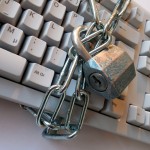 Protect your data
Protect your data
All our tablets were password protected, so the burglar(s) won’t be able to use them unless he (and I’m willing to go out on a sexist limb here and assume that they are male) either has password-cracking technology or does a factory reset – and a factory reset will wipe the data files.
The SD cards were encrypted, so they can’t be removed from the devices and read on another device – this is a separate process from password protecting the device itself, so if you keep sensitive or personal data on the SD card be sure to do both.
It’s not quite as simple on a windows laptop – the log-in was password protected, but it would be possible to remove the hard disk and read it from another device, or boot the laptop with a different operating system to bypass the protected log-in. That’s why sensitive files must be encrypted individually.
If you haven’t logged out of a website it’s sometimes possible for to access it via the browser history so even though our data should be secure, we’ve still changed all our passwords, just in case.
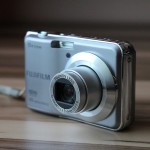 Photograph your stuff
Photograph your stuff
Back home, we’d periodically photograph our more valuable possessions for insurance purposes – just in case we ever had to prove we had them in the first place.. You know how insurance companies are – and who can blame them given the number of fraudulent claims (not a victimless crime, folks!). Actually we don’t know first hand how insurance companies deal with theft or loss claims, as we’ve never made one before. But we can guess.
Mr V had been saying for some time that he thought it would be a good idea to photograph all our luggage – not really for insurance reasons, just to remind ourselves of what we actually took along with us on the voyage. Just a few days before the burglary he got round to doing it. And then took his camera out with him on the day of the break-in (the lousy wifi meant the pictures hadn’t been backed up yet). Lucky, lucky, lucky.
We may not have receipts for anything (the receipts for the newer IT kit were in a nylon wallet that was also stolen) but at least we have pictures, including serial numbers.
In respect of the new new IT kit, it has all been photographed along with the receipts, the instructions and the packaging. Maybe we should have posed with the sales assistant in the act of keying in our credit card PINs – or perhaps that would be taking things a bit far.
 Know what your insurance policy says
Know what your insurance policy says
I’m sure I read all the exclusions and exemptions in the insurance policy when I bought it, but that was almost 3 years ago. So it had completely slipped my mind that cash was only covered if it was on our person or in a “locked safety deposit facility”. And that all computer equipment counted as ‘valuables’ and was subject to a low limit – much lower than our stuff was worth, having bought a laptop and two tablets since leaving home.
If we’d remembered these details we might still have had our IT kit nicked, but we’d damn well have been wearing our money belts, comfortable or not.
 Keep a hard copy note of important information – but securely
Keep a hard copy note of important information – but securely
One of the things we each lost was a USB stick containing a highly encrypted database of our passwords. These were a security measure against possibly insecure wifi, as it meant that user logins and passwords could be dragged and dropped onto the screen, thwarting any keylogging attempts. We had backups of these databases – on the cloud. With no computer to access the cloud!
Luckily we also had hard copy crib sheets – just enough of a cryptic hint that we could remember the password, not enough for anybody else to be able to guess it. It meant that we could speak to banks etc even before we were fully back up to speed with the new computers.
NB don’t include bank card PIN numbers in your crib sheet, not even backwards or jumbled!
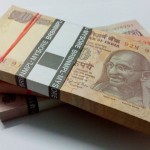 Don’t hang on to surplus cash
Don’t hang on to surplus cash
We’d developed the habit of hanging on to any remaining currency if we knew we were going to be returning to that country. It was logical – you always lose a bit in the exchange. But it meant that we had far more cash in total than we really needed. Apart from the US$ that we’d bought for Myanmar we had Thai baht, Malay ringgit and Indian rupees. As well as some sterling we’d brought out with us.
It’s what helped to make our money belts too fat to be worn comfortably, which is why they were in the travel safe, meaning that we will probably get nothing back on the insurance. From now on we will be changing money as we go, and keeping our money belts slim and wearable.
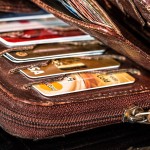 Have several bank cards and keep them in more than one place
Have several bank cards and keep them in more than one place
The bank cards that were in our money belts were not, luckily, the only cards we had – there were others in our wallets (on our person).
Only the other day our friend Connie, who runs the Ubud City Hotel, was telling us of a guest (a young girl travelling alone) whose sole card was swallowed by an ATM in Ubud. Her ONLY card! Call me paranoid, but between the two of us we left the UK with 6 credit cards (a mix of Visa, Mastercard and Amex) and 8 ATM/debit cards. And I’m still wary of using ATMs that aren’t attached to an actual bank, or outside banking hours.
Although we did need to get the stolen cards replaced, at least we didn’t have to resort to emergency cash transfers just so that we didn’t starve in the meantime.
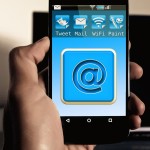 Email TC numbers to yourself – and anything else really important
Email TC numbers to yourself – and anything else really important
I know, hardly anybody bothers with travellers’ cheques these days. However, like us, you might have some that you bought for a trip ages ago and never bothered cashing in, and thought you might as well take them along as emergency funds.
I’m sure some people manage to keep the original receipt in a separate safe place even after the same TCs have been on several trips, but not me. What I had done (hallelujah!) before we left the UK was send myself an email to my webmail account listing all the numbers. Getting the money refunded (and it was quite a lot of money) just took one phone call to American Express. I ❤ American Express.
While looking for this email that I was praying I’d sent myself, I came across others to which I’d attached scanned copies of our passports, the Indian visas we got back in the UK, and some vital phone numbers. Sometimes I surprise myself.
 Card protection service
Card protection service
We get Sentinel Gold as a perk of one of our bank accounts. You log the details of all your credit cards online, and if any are lost or stolen you phone Sentinel – they phone the bank to get the card(s) stopped and new ones issued.
If you lose cards in your home country, phoning several banks might not be such an issue, but it was a blessing for us to be able to phone one number (on a borrowed phone) to get 8 cards dealt with.
If you don’t have a service like this, and don’t want to pay for one, at least make sure that you have a separate hard copy note of all your card details (but not including the expiry date or the CVV number) and the telephone numbers you need to report loss, and keep it on you (see Skype section below). And a second copy of the note that you keep somewhere else.
 Don’t let a big loss blind you to the smaller ones
Don’t let a big loss blind you to the smaller ones
When we first discovered that we’d been burgled we were so focussed on the loss of our travel safe, which contained all our laptops and tablets, and our money belts containing our driving licences (as well as cash, bank cards and travellers’ cheques), that we kind of forgot about everything else, and so that was all that we reported to the police.
It was only when we started to clear up, and found Mr V’s GoPro camera among the clothes strewn on the floor, that we even remembered it had been there. Over the following week we gradually realised there were more and more things missing – a pair of glasses, a pouch containing paperwork, a silk sleeping bag, all our earplugs, some medical supplies etc. None of these things was worth much on its own but, given the tight limit on compensation for valuables, they would have added up to a worthwhile sum that we could have claimed under the general baggage section. But they’re not listed on the police report.
We should have been much more rigorous and systematic in checking what was missing, instead of assuming it was just the travel safe.
You probably already knew that, but we had only really used the free side of it for chatting to family and friends. The day after the burglary we took out a month’s Unlimited World subscription that gave us calls to landlines worldwide. It was actually a free trial so cost nothing, although it would only have been around £8. During that month we spent over 10 hours in total on international calls to banks, insurance company, car hire firms and airlines etc. If we’d had to pay standard rate call charges it would have cost more than we lost in the burglary.
Unfortunately it seems that many UK institutions don’t give much thought to customers trying to contact them from abroad. It’s easy to find their 0800 or 0845 numbers, but numbers that will work from overseas are hidden away on the furthest corner of their website.
Virgin Mobile were the worst, which is ironic for a communications company. You can’t email them, you have to use Facebook or Twitter, and even then the only number they could provide was a non-geographic 07 number, which will work from abroad but isn’t covered by a Skype subscription – you have to buy Skype credit and pay per minute (although it’s still much cheaper than a normal phone call). Eventually I found a number on a forum for irate Virgin customers.
I now have all bank etc geographic phone numbers stored on my Google contacts – if I’d done that before, it would have saved a lot of time (ie money!) at the internet cafe.
 Having replacement stuff sent from home
Having replacement stuff sent from home
We had to have replacement bank cards and driving licences sent from the UK, so we took the opportunity to buy some other items from Amazon and have those sent on in the same parcel. This could have been a disastrous decision.
We’d previously had some expired bank cards replaced, and on that occasion the DHL package was delivered to us in Bangkok right on schedule, within 4 days of its dispatch. So naturally we expected the same kind of timescale. What we hadn’t factored in was that because there were actual goods in the parcel it had to go through customs, and because there was no declaration of value broken down in exactly the way that Malaysian customs required it (ie not just “Earplugs, £10” but “40 earplugs@£0.25 each”) it stayed in customs for over a week. Getting it released involved numerous phone calls and emails to DHL, and a great deal of stress as our flight date loomed closer. We had to pay duty on the value of the shipping cost as well as the goods, and only avoided a £30 penalty charge thanks to the persistence of the DHL agent.
So if you are having goods sent from home, not just documents, allow plenty of extra time for customs clearance, make sure that the contents are itemised and costed down to the last paperclip, and be prepared for the extra charges. I would actually pay the extra shipping costs and have the documents sent in a separate package, if it was the documents that were the really vital things.
 Replacing your gadgets
Replacing your gadgets
If you have to replace phones, computer equipment or cameras, try to do this in a country where English is widely spoken, and which uses the Roman alphabet for its own language.
We had bought one of our stolen Samsung tablets in Thailand, and we never did manage to change it completely into English – the keyboard on the initial log-in screen remained resolutely Thai. When Mr V shopped for a new camera in Japan, he found that the menu on some models was in Japanese only, even though the same model was on sale in other countries.
We went to Kuala Lumpur after the robbery, and it was an excellent place to buy computer equipment. All the sales assistants spoke good English and there were no alphabet issues. We had to leave Bali anyway as our visas were about to expire, but in any case I’m not sure that Bali would have been able to offer the same range of kit – tracking down the specific laptop that Mr V wanted was hard enough even in KL.
 It’s only Stuff
It’s only Stuff
The burglary caused us a huge amount of stress and extra expense, a lot of which was due to the loss of our driving licences, which in turn meant re-arranging the whole of our Australia trip as we wouldn’t be able to hire a car. Waiting for the replacement licences was agonising – we eventually got them only 8 days before the new Australia departure date, and only 48 hours before we left KL. We both went down with bad colds and coughs which I’m convinced were the consequence of stress.
But in many ways we were lucky. We didn’t lose anything irreplaceable or of sentimental value. We didn’t run into the burglar(s) so were at no risk of physical harm. We are hurt by the financial loss, of course, but not crippled by it. We didn’t lose our passports. We can carry on travelling – we’ve just had to change our timetable (although that does mean we will miss connecting with friends in India which is disappointing). Our luggage weighs less now, and in rebooking the Australia trip we made it a bit longer (partly by choice, partly forced by flight availability). The incident made me angry, and disappointed with Bali, and suspicious of people. But I’ll get over it.
As my long ago former manager used to say to reassure us whenever something went horribly wrong, “nobody died”. It was just Stuff. Like the Stuff in storage back home that I’ve mostly forgotten exists. But if we hadn’t taken all the IT precautions that we had, it would have been so much worse.

